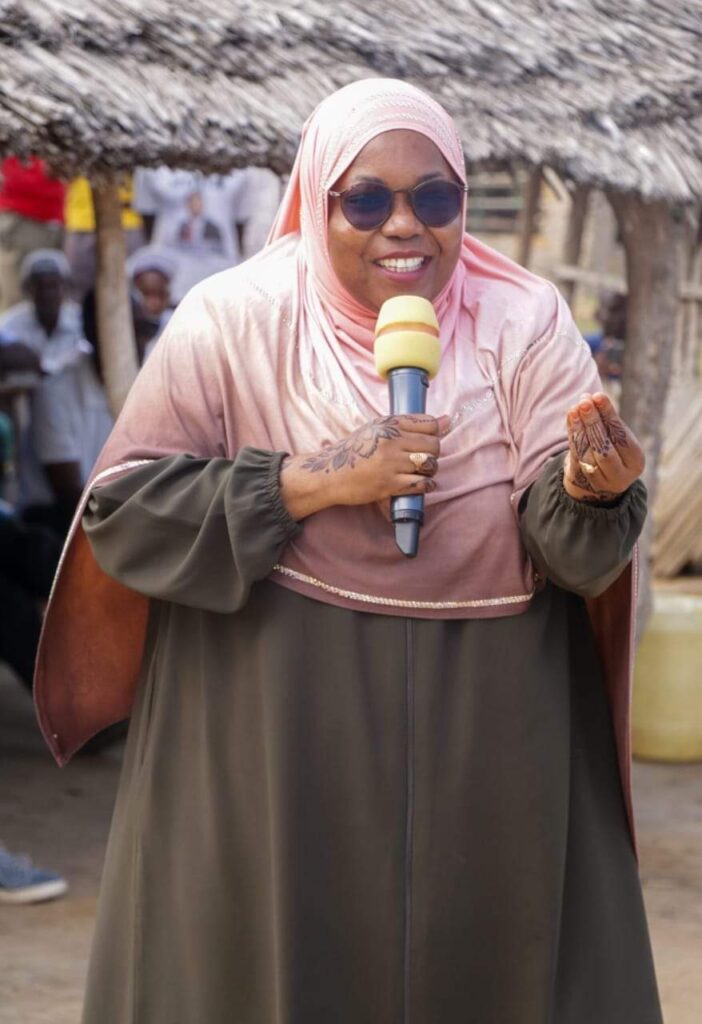By Mwanaharusi Rashid.
Kwale County Governor Fatuma Achani called on the national government and other key stakeholders involved in the construction of the Mwache Dam, to implement the project fairly under the original proposals.
She made the remarks during the opening ceremony of Miguneni ECDE center in Kasemeni Ward, Kinango, where she expressed concern over what she perceives as discrepancies in the execution of the project, which is set to play a crucial role in addressing water shortages in the county.
Governor Achani voiced her concerns that certain aspects of the Mwache Dam project, as initially proposed by residents, are not being implemented as planned.
She highlighted that some of the commitments made to the community during the planning stages have not been honored, leading to growing discontent among the residents of Mwache.
“The people of Mwache and surrounding areas have been looking forward to the completion of this dam, not just because of the promise of water security, but because of the broader economic and social benefits that were promised alongside this project,” Achani said.
“However, it is disheartening to see that some of the projects proposed by the locals are not being implemented as agreed upon.”
Achani’s comments reflect a broader concern that the interests of local communities are being sidelined in favor of national priorities, a situation she described as unacceptable.
She emphasized that the equitable distribution of benefits from the project is crucial for maintaining trust and cooperation between the government and the residents of Kwale County.
The governor’s appeal was not just a request but a firm demand that the Mwache Dam project be executed fairly and in alignment with the promises made to the community.
She urged the national government and all stakeholders to respect the agreements made with the residents and to ensure that the project delivers tangible benefits to those most affected by its construction.
“The Mwache Dam is a significant infrastructure project, and its success depends not just on the engineering and construction but also on the goodwill and support of the local communities. We must ensure that this project is implemented in a manner that is fair and just, and that the people of Mwache are the primary beneficiaries,” she said.
Achani further warned that any attempt to sideline the local community or to disregard their input would be met with strong resistance.
She characterized the current situation as a form of injustice against the people of Kwale, vowing that her administration would not stand by while the rights of her constituents were overlooked.
“I want to make it clear that the people of Kwale will not be marginalized in their land. The benefits of the Mwache Dam project must be shared equitably, and the government must fulfill its promises,” she stated.
The Mwache Dam, once completed, is expected to be a transformative project for both Kwale and Mombasa counties.
The dam is anticipated to alleviate chronic water shortages that have plagued the region for years, providing a reliable water supply for domestic, agricultural, and industrial use.
In addition to improving water security, the project is also expected to contribute to economic growth through increased agricultural productivity and the creation of jobs during both the construction and operational phases.
However, the success of the Mwache Dam project hinges not only on its technical execution but also on how well it meets the expectations and needs of the local communities.
For the residents of Mwache, the dam represents more than just a solution to water scarcity; it is also a symbol of development and a promise of a better future.
Any perception that the project is being mishandled or that the community’s interests are being disregarded could undermine the project’s long-term success.
Governor Achani’s call for fairness in the implementation of the Mwache Dam project highlights the critical importance of community engagement and adherence to agreements in large-scale infrastructure projects.


